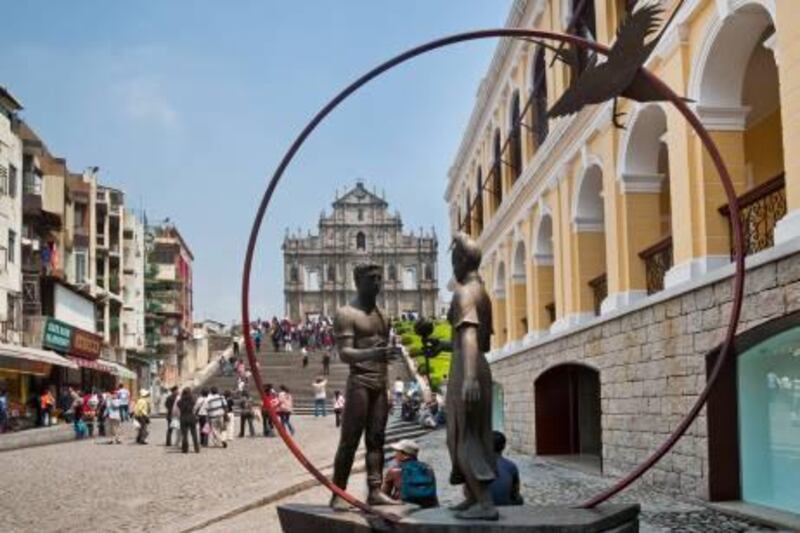Why Macau
This former Portuguese colony is an astonishing collision of low kitsch and high culture. While the territory is famous for its casinos, there's a lot more to the world's oldest former colony than that. In the historic centre, Portuguese grandmothers speak fluent Cantonese in cafes that would not be out of place in Lisbon, and Chinese bird fanciers take their caged finches for walks in some of the world's most gracious parks. Either through careful design or happy accident, gambling Macau and historic Macau are barely visible to each other.
A comfortable bed
Macau does much with what it has, and its boutique hotels offer a welcome respite from the garishness of the casinos. At the top end is the Pousada de São Tiago (www.saotiago.com.mo; 00 853 2837 8111). It is built into a 17th-century Portuguese fortress and has some of the most commanding views in the city. Access to the reception area is through the fort's original stone entrance tunnel, and the terrace and swimming pool are set among shady trees. Double rooms cost between HK$2,600 and HK$4,500 (Dh1,227 to Dh2,124) per night, but some internet deals can cut these prices in half.
One of Macau's best-kept secrets is Pousada de Mong-Há, set in beautiful gardens near the Mong-Há fortress (www.ift.edu.mo/pousada/eng/index.htm; 00 853 2851 5222). The hotel is actually the training facility for Macau's Institute for Tourism Studies and is manned by eager students. Classically Portuguese and offering a stunning breakfast, the hotel represents excellent value for money. Rooms range from HK$600 (Dh283) per night for a standard room up to HK$1,500 (Dh707) for a suite on the weekend.
Find your feet
After the slight starchiness of Hong Kong, the lack of safety belts in Macau's cabs reminds you immediately that you're in a looser, more Mediterranean world. Get the cab driver to take you from the ferry straight to Senado Square, where most of historic Macau is accessible on foot. The square is a pedestrian zone, packed with shoppers on weekends and holidays but nevertheless deeply charming. Follow the mosaic of cobbles past St Dominic's Church, one of the most outstanding examples of Portuguese baroque architecture in the territory, and up the hill to the Ruins of St Paul's. This bizarre, evocative structure is all that remains of the Jesuits' first church in China. It was built in the early 17th century and burnt to the ground in 1835, leaving just the facade. The stonemasons were Japanese Christians who had fled persecution; the scenes depict the history of Christianity in Asia.
Meet the locals
Local cafes have long since been pushed out of Senado Square by retail chains such as Benetton and Starbucks, but fortunately the Macanese love for coffee, Portuguese tarts and whiling away the afternoon persists in the square's side streets. Take the street that runs next to Senado's only McDonald's to reach the Ou Mun Cafe. A favourite haunt of the local Portuguese community, it serves fantastic coffee and toasted sandwiches. Later, take a walk through the park Jardim Luís de Camões, a beautiful garden named after the territory's national poet, where locals often admire each other's caged finches. Sometimes, people can be heard practising the erhu (a two-stringed Chinese violin) out of earshot of the neighbours.
Book a table
The Macanese are justly proud of their cuisine - a fusion of Chinese and Mediterranean cooking - and will pack out local restaurants on weekends and holidays. A Lorcha near the old docks in Macau (Rua do Almirante Sergio 289, Inner Harbour; 00 853 2831 3193 95) serves the territory's famous African chicken, a Portuguese colonial dish that combines Goan and east African influences, grilling the chicken with chillies and spices (HK$118; Dh55). Fernando's (9 Hac Sa Beach, Coloane Island; 00 853 2888 2264) is a firm favourite, and on some weekends it can be almost impossible to get a table. The restaurant does not take bookings and works strictly on a first-come, first-served basis. Main courses range from HK$80 to HK$160 (Dh37 to Dh75).
Shopper's paradise
Macau has a lively market in Chinese antiques and furniture - some of it original and most of it knock-offs produced in mainland factories. The proprietors seem happy to guide customers through their goods, merrily pointing out the originals from the fakes. Lacquered medicine cabinets and Tibetan chests of drawers are a speciality. Give any of the shops along the Rua de São Paulo your required dimensions and the plans go to nearby Zhuhai, where factories will produce the furniture within a matter of days. The stores will organise shipping for you and can send consignments to most parts of the world.
What to avoid
Unless you're travelling with children, avoid Fisherman's Wharf - it features miniature replicas of Amsterdam, Venetian streetscapes, an ancient Roman-themed shopping arcade and sundry other architectural glories, including Tibet's Potala Palace.
Don't miss
The Lou Kau mansion is one of the few intact Qing dynasty residences in China and is an architectural time capsule. Easily missed in the warren of streets behind Senado Square, the house was built in 1889 by a Chinese merchant who made a fortune operating gambling facilities. The sections of the house are built around open atriums and light wells that drain rainwater directly from rectangular stone pools in the floor.





